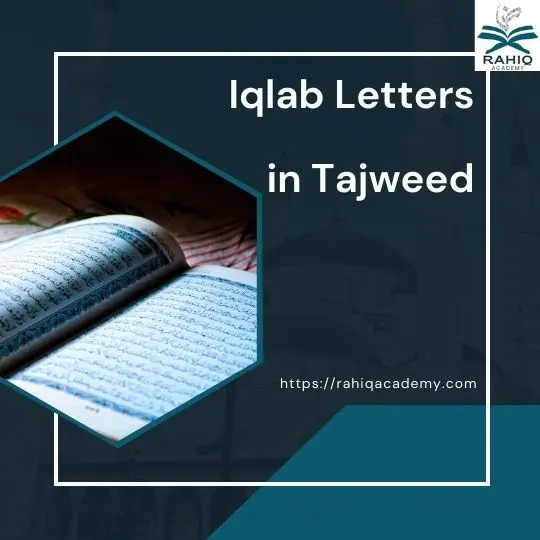Iqlab is a crucial rule in the science of Tajweed, which helps ensure that Quranic recitation is both melodious and accurate. The term “Iqlab” is derived from the Arabic root “قلب,” which means “to change” or “to turn.” In Tajweed, Iqlab refers to the conversion of a noon sakinah (ن) or tanween into a meem sound (م) when followed by the letter ب (ba). This rule helps in creating a fluid transition between sounds, thus preserving the recitation’s smoothness.
let’s learn Iqlab Letters rule in Tajweed
What Is Iqlab?
Iqlab occurs when a noon sakinah (ن) or tanween is followed by the letter ب. In this case, the noon sound changes into a meem sound, accompanied by a subtle nasalization known as ghunna. A small meem (م) is placed above the noon sakinah or tanween in the Quran to indicate where the reciter should apply this rule.
For instance, consider the verse:
“مِن بَعْدِهِم”
“After them”
(Al-Hashr,59:10)
In this example, the noon sakinah in مِن changes to a meem sound due to the ب in بَعْدِهِم, ensuring a smooth transition without harsh breaks between sounds.
What Is Qalb Tajweed?
In Tajweed, Qalb and Iqlab are synonymous terms, both referring to the transformation of a noon or tanween sound into a meem when followed by the letter ب.
This transformation helps maintain a seamless flow in Quranic recitation. Failing to apply the rule correctly could lead to awkward pronunciations and disrupt the rhythm of the recitation.
What Are the Letters of Iqlab?
There is only one letter that activates the Iqlab rule: the letter ب. When ب follows a noon sakinah or tanween, the noon sound is replaced by a meem sound.
What Is the Condition for Iqlab?

Iqlab is applied when a noon sakinah (ن) or tanween (ـًـٍـٌ) is followed by the letter ب. This specific combination requires the noon sound to be converted into a meem sound, with nasalization for two counts, ensuring clarity and fluidity in recitation.
For example, in the verse:
إِنَّ اللّهَ بَصِيرٌ بِمَا يَعْمَلُونَ
“Indeed, Allah is All-Seeing of what they do”
(Ali ‘Imran 3:163)
How to Pronounce Iqlab in 4 steps
To pronounce Iqlab correctly, follow these steps:
- Identify the occurrence: Look for a noon sakinah or tanween followed by the letter ب.
- Convert the sound: Change the noon or tanween sound into a meem sound.
- Apply nasalization (ghunna): Recite the meem sound with a light nasal tone for two counts.
- Ensure smoothness: The recitation should remain fluid, avoiding exaggerated nasalization or harsh breaks between letters.
For example, in the verse:
“وَمَا يَنۢبَغِى لَهُمْ وَمَا يَسْتَطِيعُونَ”
“it is not for them ˹to do so˺, nor can they,”
(Ash-Shu’ara,26:211)
Here, the noon sakinah in مِن changes into a meem sound because of the following ب.
Importance of Iqlab
Iqlab is important for several reasons:
- It ensures a smooth and melodic recitation by preventing awkward sound transitions.
- It helps the reciter maintain correct pronunciation.
- It preserves the traditional recitation method, which has been passed down from the Prophet Muhammad (PBUH).
- Applying Iqlab correctly contributes to the overall beauty of the Quran’s recitation.
Incorrect application of Iqlab can disrupt the flow and affect the meaning of the verses, making this rule essential for all Quran reciters.
Noon of Assertion and Iqlab
The noon of assertion is a special noon sakinah used to add emphasis. When it is followed by ب, the Iqlab rule still applies, ensuring that both the grammatical emphasis and the smoothness of the recitation are maintained.
For example:
لَيُنْبَذَنَّ فِي الْحُطَمَةِ
“He will surely be thrown into the Crusher”
(Surah Al-Humazah, 104:4)
In this example, the noon of assertion in لَيُنْبَذَنَّ is followed by ب, applying the Iqlab rule.
10 Examples of Iqlab in Quran
- (…وَاِنْ یَّخْذُلْكُمْ فَمَنْ ذَا الَّذِیْ یَنْصُرُكُمْ مِّنْۢ بَعْدِهٖؕ…) (Ali-Imran:160)
- (…و اللّٰهُ اَعْلَمُ بِاِیْمَانِكُمْؕ-بَعْضُكُمْ مِّنْۢ بَعْضٍۚ…) (An-Nisa:25)
- (وَاللّٰهُ یَسْمَعُ تَحَاوُرَكُمَاؕ-اِنَّ اللّٰهَ سَمِیْعٌۢ بَصِیْرٌ…) (Al-Mujadila:1)
- (فَاَذَّنَ مُؤَذِّنٌۢ بَیْنَهُمْ اَنْ لَّعْنَةُ اللّٰهِ عَلَى الظّٰلِمِیْنَۙ…) (Al-A’raf:44)
- (وَاَسِرُّوْا قَوْلَكُمْ اَوِ اجْهَرُوْا بِهٖؕ-اِنَّهٗ عَلِیْمٌۢ بِذَاتِ الصُّدُوْرِ) (Al-Mulk:13)
- (كَفٰى بِهٖ شَهِیْدًۢا بَیْنِیْ وَ بَیْنَكُمْؕ-وَهُوَ الْغَفُوْرُ الرَّحِیْمُ…) (Al-Ahqaf:8)
- (كَلَّا لَیُنْۢبَذَنَّ فِی الْحُطَمَةِ٘ۖ) (Al-Humazah:4)
- (اِذِ انْۢبَعَثَ اَشْقٰىهَا) (Ash-Shams:12)
- (وَاَنْتَ حِلٌّۢ بِهٰذَا الْبَلَدِۙ) (Al-Balad:2)
- (بِاَیِّ ذَنْۢبٍ قُتِلَتْۚ) (At-Takwir:9)
These examples demonstrate how Iqlab is applied in various verses, ensuring a seamless recitation experience.
Conclusion
Mastering the Iqlab rule is essential for anyone learning Tajweed. It helps in maintaining the integrity and flow of Quranic recitation. Applying Iqlab correctly not only ensures accurate pronunciation but also enhances the beauty of the recitation, making it more spiritually uplifting for the reciter and the listener alike.
At RAHIQ Academy, we offer expert-led courses on Tajweed, including the detailed rules of Iqlab, to help you perfect your recitation. Our personalized instruction ensures that you learn each rule thoroughly, allowing you to recite the Quran with clarity and confidence. Enroll in our Quran Tajweed Course today and take your recitation to the next level with RAHIQ Academy!




